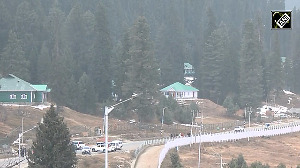The Pentagon's Defense Security Cooperation Agency last month notified Congress of its intent of such a sale to India, saying, 'The two leased P-3C aircraft will replace two existing Indian Navy patrol aircraft, Soviet-built IL-38 May aircraft, which are quickly reaching the end of their fatigue and operational service life.
'India is capable of absorbing and maintaining these additional aircraft in its inventory,' the Pentagon said, adding that the logistical support India has requested would include training devices, operations and maintenance training, personnel training, as well as spare parts.
'The proposed sale will contribute to the foreign policy and national security of the United States, by helping to improve the security of an important ally and to strengthen the US-India strategic partnership that continues to be an important force for political stability, peace and economic progress in South Asia.'
A Congressional source told rediff-India Abroad that the Pentagon notification does not mean the sale is a done deal, since the Congress by law has 30 days from the date of notification to block the proposed sale.
However, said the source, "There has not been even one lawmaker who has raised a question, and considering that the defense manufacturers' lobby has been pushing for such sales, talking of jobs and so on if military sales can be made to countries like India and warning that spiking such sales could lead to plant closings, this sale is a shoo-in.
"Also, the Administration has assured Congress that this proposed sale will not alter the basic military balance in South Asia, and there have been no lobbyists (from Pakistan's side) who have expressed any concerns and called for any lawmakers to oppose this sale."
The proposed sale is in keeping with the military cooperation accord signed by Defense Secretary Donald Rumsfeld and India's Defense Minister Pranab Mukherjee, during the latter's June visit to Washington DC.
The DSCA in pitching the sale said India needed such aircraft for land-based maritime patrol, and reconnaissance against submarines and surface warfare ships as well as to protect its economic exclusion zone.
'Modernization will enhance the capabilities of the Indian Navy, support its regional influence and meet its legitimate self-defense needs,' the DSCA said. 'Implementation of this proposed sale will require technical assistance prior to the delivery of the first aircraft, and continued involvement by US and contractor representatives to India for three years. There would be no adverse impact on US defense readiness as a result of this sale.'
Ron Somers, president of the US-India Business Council, told rediff-India Abroad that defense industry members of the USIBC, who had been lobbying furiously for India to make some tangible procurements of American military hardware and weapons systems so that the military cooperation agreement could begin to evolve, were "thrilled" over the proposed lease, and hoped it would translate into a sale and more purchases in the near future.
"We were delighted that the manifestation of strategic partnership is finally coming through, with real cooperation going beyond mere commercial cooperation, and now we are entering into the defense and military sphere," he said. "This is important, because it really is the underpinning of trust between the two countries."
He acknowledged that the US defense industry had been arguing for some time that it was time to get beyond symbolism and into a "real partnership leading to an alliance of the two democracies."
While acknowledging that the transfer of P-3Cs were only a lease, Somers said, "We are hoping that in time for the Presidential visit (to New Delhi, projected for some time in February), a significant purchase of American equipment could be made by the Ministry of Defense of the Government of India."





